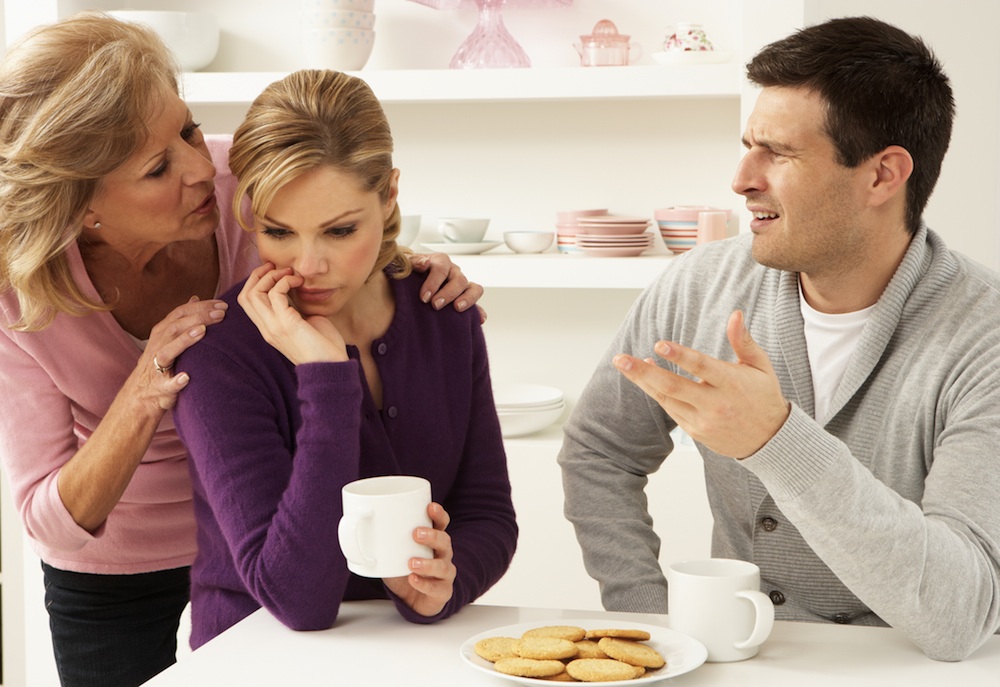Why Everyone's a Parenting Expert

New Jersey mom Eileen Wolter likes to take her two sons to a park where most kids run around barefoot. She doesn't let her 3- and 6-year-olds take off their shoes though, a rule that has, at times, gotten her pushback from a strange source: other parents.
"Last week, my older [son] was trying to make all kinds of deals" to take his shoes off, Wolter, who blogs at asuburbanstateofmom.com, told LiveScience. "I kept saying no until another mom said, 'Just let the kid get dirty.' I literally wanted to punch her."
A small matter, perhaps, but one fraught with huge emotion. With summer here and kids at home, there's a whole new set of parenting decisions that other parents (and even non-parents) feel obligated to judge. In many cases, the parental "sins" seem arbitrary. Chicago clinical psychologist John Duffy has one client whose own parents call her a "slave driver" for requiring her 12-year-old daughter to mow the lawn as a summer chore. Another family gets flak from friends for letting their son play a few hours of video games on summer days.
"Mommy wars" and media blowups over parenting choices are common. Just this week, actress Gwyneth Paltrow faced Internet criticism for allowing her 5-year-old daughter to get her ears pierced. And last month, a Canadian couple sparked a public firestorm when they told a local newspaper that they were keeping their youngest child's gender a secret.
This parental scrutiny may be a product of insecurity, psychologists say. Similarly, the defensiveness people feel when judged is sometimes related to their own concern about how to be a good parent. And a mix of ingredients, from social upheaval to human biology, comes together on this parental playground to make for lots of controversy.
"Parenting is something most of us experience, and even if we don't experience it firsthand, we observe it," Kathleen Gerson, a sociologist at New York University, told LiveScience. "On the one hand, we all think we're experts at it. On the other hand, we're very uncertain about doing it. That is a recipe for conflict and disagreement and strong emotions on both sides." [Understanding the 10 Most Destructive Human Behaviors]
What makes a good parent?
Get the world’s most fascinating discoveries delivered straight to your inbox.
There is such a thing as a bad parent, of course. But most of the decisions that people get steamed about don't fall into the extremes, said Amy Bohnert, a psychologist who researches child development at Loyola University.
"There are a lot of different ways to raise kids, and there's not one formula that works for every kid," Bohnert told LiveScience.
The basics, she said, are to foster a secure, warm attachment with your child so they know their needs will be met and they have a place to go for comfort. As kids grow older, Bohnert said, they need freedom to explore and make mistakes, but with age-appropriate boundaries. Most of the kids caught in the crossfire of the mostly middle- to upper-middle-class "mommy wars" get these basic needs met, she said. The controversies mostly arise from the details: To co-sleep or not to co-sleep. The best potty-training method. What time to set curfew.
In those details, Bohnert said, there is a lot of "wiggle room." Different styles work for different kids. And even when a parent leans toward overindulgence or protectiveness, she said, the wider world usually provides a counterbalance.
"Even kids who have an overindulgent parent, are they going to come out okay?" she said. "Probably, because they're going to have a teacher that holds the line with them. … There's sort of this built-in balance of power."
Strong feelings
Multiple parenting styles may work, but most people seem convinced that their way is better than all others. Part of the reason may boil down to the American belief in individualism, Gerson said. So rather than the "it takes a village" mentality, middle-class Americans tend to believe that individual parenting decisions are the major determinant of how well a child will do in adulthood, she said. That makes even minor choices seem high-stakes. [5 Ways to Foster Self-Compassion in Your Child]
Parenting becomes a flashpoint for controversy especially in times of rapid change, Gerson said. The last few decades, with more women moving into the work force and more men focusing on their home lives, have been a time of upheaval. In addition, Gerson said, the recession has made middle-class workers more anxious about whether their children will grow up with the same standard of living as they had.
Even with these changes, women bear the brunt of such parental criticism. That's because moms are held to an unattainable standard of perfection, while dads are considered incompetent from the get-go, said Donald Unger, a lecturer in humanities at the Massachusetts Institute of Technology and author of "Men Can: The Changing Image and Reality of Fatherhood in America" (Temple University Press, 2010).
That double standard is held over from the days when most well-off women stayed home with their kids, Gerson said.
"These notions of parenthood seem to be vey hard to overcome even though they don't reflect the actual behavior of parents," she said.
On top of social factors, add in the human brain, which is built for moral judgments. A brain area called the ventromedial prefrontal cortex, which sits between and behind the eyes, is responsible for the emotional aspect of moral judgment, said Liane Young, a psychologist at Boston College. People with damage to this region don't get the "gut feeling" that something is wrong. For example, they're much more likely than people without brain damage to say that it's okay to deliberately harm one innocent person to help many others.
"It's not just abstract reasoning, but we really experience at an intuitive gut level the judgments that we make of other people's actions," Young said. "Which is why oftentimes our own moral judgments feel very robust."
Parenting, too, is strongly related to our own self-esteem, whether it's in raising a child or thinking back on how we were raised. And then there is the impossibility of knowing the ultimate effect of any given parenting decision, because it takes years for a child to grow up.
"It's deeply personal, and it's emotional," Bohnert said. "You always feel like, 'Is this the right choice or the wrong choice?' and you want to feel like there's an answer. But there isn't an answer for 25 years!"
Beyond judgment
Duffy, the Chicago psychologist and author of "The Available Parent: Radical Optimism for Raising Teens and Tweens" (Viva Editions, 2011), said that every family he works with worries about being judged. His method for helping parents cope is to first find out whether they feel the judgment is valid.
"Often, in the same breath a parent will say, 'I think my mother's really down on me with how I deal with my daughter, and I am, too,'" Duffy said.
If, instead, the anxiety over the judgment arises from the parent's own insecurity rather than parenting choices that they're struggling with, Duffy advises them to focus on creating a strong bond with their child. Most of the time, he said, he tells parents to trust their instincts.
On the other hand, Duffy said, he often meets parents who are quick to judge others.
"That often comes from insecurity, too," he said. "Oftentimes, parents are rivals, even if the other parent doesn't know they're in a contest."
His advice for judgmental types? Cut it out — for the sake of the children.
"If you find that you're judgmental, your kid will follow suit," Duffy said. "I've run into that in families many times, and it's hard to undo."
You can follow LiveScience senior writer Stephanie Pappas on Twitter @sipappas. Follow LiveScience for the latest in science news and discoveries on Twitter @livescience and on Facebook.

Stephanie Pappas is a contributing writer for Live Science, covering topics ranging from geoscience to archaeology to the human brain and behavior. She was previously a senior writer for Live Science but is now a freelancer based in Denver, Colorado, and regularly contributes to Scientific American and The Monitor, the monthly magazine of the American Psychological Association. Stephanie received a bachelor's degree in psychology from the University of South Carolina and a graduate certificate in science communication from the University of California, Santa Cruz.
 Live Science Plus
Live Science Plus





